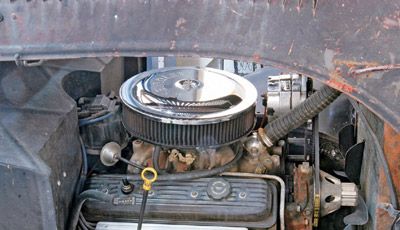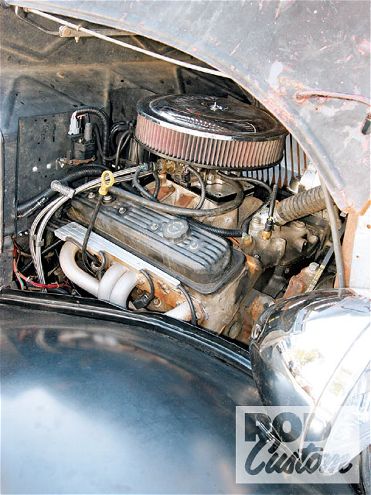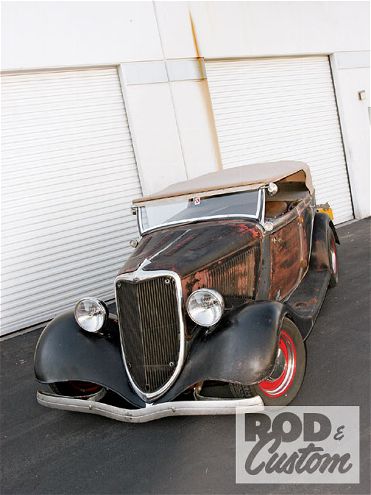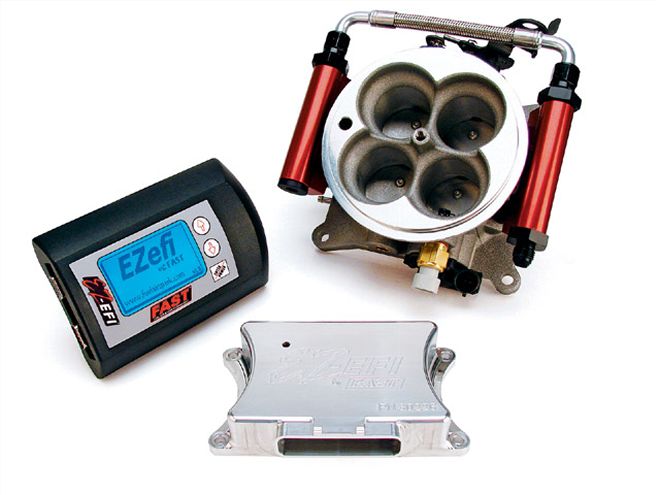

We're going to give you three words that strike fear into the hearts of many hot rodders, even more so than "wiring" or "upholstery." Electronic fuel injection. There, we said it! But the simple fact of the matter is, EFI shouldn't scare anyone. Or at least it shouldn't anymore. Images of tuning using laptop computers and miles of wiring leading to any number of mysterious black boxes can be dispelled nowadays. Of course, you can still have that if you wish, but you can also have "fit and forget" EFI too.
To prove our point, we followed along at Kiwi Steve's Hot Rod Shop as the guys were installing throttle body injection (TBI) on Jules Engoren's '34 phaeton. Jules has owned the tub forever; in fact it was his first real car, and he drives it everywhere. A few years back he installed a crate ZZ4 engine, but noticed a lack of power at high altitudes, such as in Colorado, and not-so-great fuel economy at speeds above 70 mph. Yes, this is one well-traveled and hard-driven hot rod, and Jules wanted it to remain that way. Discussions with Kiwi Steve led to the decision to replace the Edelbrock carburetor with fuel injection, but on a budget. Which is why the throttle body itself and the distributor are OEM GM swap meet finds. The throttle body is what you'd find on an '88-95 Suburban or truck with a 350ci engine. The adaptor plate and even the wiring harness, though brand-new, were sourced on everyone's favorite Internet auction site.
 Here's our subject vehicle, Jules Engoren's much-traveled and road-worn '34 phaeton. Throughout the following pictures bear in mind this is an older, homebuilt hot rod and not some pristine show car!
Here's our subject vehicle, Jules Engoren's much-traveled and road-worn '34 phaeton. Throughout the following pictures bear in mind this is an older, homebuilt hot rod and not some pristine show car!
That harness was produced by Howell Engine Developments, which is also where the ECM was sourced from. In fact all the components used here are available from Howell, and indeed they can supply a Universal V-8 Throttle Body kit, but where OEM parts from a parts house or good used parts could be used for this particular job, they were. The ECM is the computer that mounts inside the car. Howell uses GM ECMs, which are commonly found in pickups and vans from 1987-95. They are tested and carry a guarantee, and the Howell Throttle Body Injection wiring harness is designed to work with these ECMs. Howell also offers custom-calibrated, application-specific PROMs, the "chip," if you will, that sets the parameters for engine and transmission (if electronically controlled) calibration. It would be easy to get lost in the differences between ECMs and PCMs and PROMs and MEM-CALS here, so we'll simply say do some research for your application, such as year of engine and transmission, or leave it to the experts such as the guys at Howell, who will be able to hook you up. Meanwhile, we'll concentrate on the application in our guinea pig phaeton.
Before we start, we should mention that it's a good idea to trial-fit everything before modifying anything, check for clearance for the new fuel supply and return lines (yes, you'll need to add a return line for injected motors) against the intake manifold, adaptor, or distributor, and check for clearance between the hood or radiator braces and the throttle body. We should also mention that one thing we haven't shown here is the speed sensor, an electronic pulse generator that mounts in the speedometer drive to tell the ECM when the car is at rest or at what speed it's traveling.

EZ EFI
We couldn't run an article on easy-to-install throttle body fuel injection without mentioning this new system from FAST. The EZ-EFI system is a self-tuning injection system that can support up to 550hp and is supplied complete with the ECU, oxygen sensor, wiring harness, and optional fuel pump.
The business end of the package is the 4150 throttle body which can be bolted to any existing 4150-type inlet manifold and includes appropriate injectors and fuel rails. The original throttle linkage can be used and it accepts all OEM sensors. FAST claims the system can be installed in less than a day and doesn't require any EFI experience or expertise. Once the hardware is installed, a few Setup Wizard questions have to be answered on the included handheld display and the system tunes itself while the car is driven.